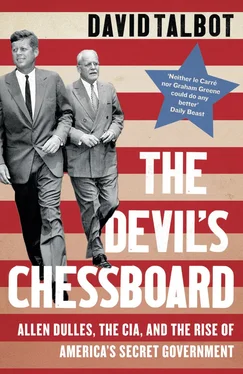But, in the end, even with Morris’s expert hand, Dulles could not wrestle his manuscript into shape, and the old spook withdrew it from publication. By the time Dulles finally gave up, after months of toil, the article had gone through multiple drafts, adding up to several hundred coffee-stained pages. The drafts, now stuffed into boxes at a Princeton library where the Dulles papers are housed, are a window into Allen Dulles’s tortured relationship with the young president. In finally abandoning the massive project, which one historian later called “ The ‘Confessions’ of Allen Dulles,” the old spymaster seemed to conclude that he was saying both too much and too little about what he had been through with Kennedy.
By writing the article, Dulles had set out to rebut charges made by JFK loyalists Theodore Sorensen and Arthur Schlesinger Jr. that Kennedy had been tricked by his intelligence advisers into the disastrous Cuban adventure. But instead, the spymaster’s scribblings—in between angry eruptions at Kennedy and his White House circle of “doubting Thomases” and “Castro admirers”—revealed the myriad ways that Dulles’s CIA had indeed contrived to lure the young president into the Cuban sand trap.
When the Bay of Pigs operation was under way and “the chips were down,” Dulles wrote, he was confident that JFK would be compelled to do the right thing and send in the awesome power of the U.S. military to rescue the invasion. That’s the way the CIA game was played: there was a certain amount of hoodwinking and massaging of White House anxieties, and then the president fell in line. But this time, the president, despite his youth and the collective browbeating of his gray-haired national security ministers, stood his ground. Kennedy said no to expanding an operation that he had felt all along was sordid. And the long reign of Allen Dulles came crashing down.
At least, that’s the way Dulles’s story is told in biographies and CIA histories. The truth is that Dulles’s reign went on, deeply cloaked, toward an even more catastrophic conclusion.
In the first days and weeks after his ouster, Dulles’s world caved in. Suddenly unmoored from the daily routines of power he had known ever since he was a budding young spy in the service of Woodrow Wilson, Dulles seemed “ a very tragic man,” in the words of one CIA colleague. He shuffled around his Georgetown home, with his gout-ridden feet softly coffined in bedroom slippers. But Dulles’s “tragic” period did not last long. He soon began meeting with a surprising range of CIA officers—men from the top rungs of the agency, as well as agents from the field. They paraded in and out of the brick manor on Q Street, huddling with him in his book-lined study and on sunny days quietly chatting on his walled-in terrace. His day calendar was filled with yet more meetings at his favorite Washington retreats, the Alibi Club and the Metropolitan Club, where he dined with the same generals and national security wise men with whom he had done business at the CIA. It was, in fact, as if he had never left the spy agency.
Dulles would turn his Georgetown home into the center of an anti-Kennedy government in exile. As time went by, the Dulles circle became ever more disenchanted with JFK’s foreign policy, which they considered appeasement of the Communist enemy. Dulles grew bolder in his opposition. He met with a controversial Cuban exile leadernamed Paulino Sierra Martinez, a former henchman for the deposed dictator Fulgencio Batista. Sierra, whose anti-Castro activities were underwritten by the Mafia and U.S. corporations with a stake in Cuba, later fell under Secret Service suspicion in a conspiracy against President Kennedy. The topic of Sierra’s meeting with Dulles in April 1963 remains a mystery.
By October 1963, Dulles felt confident enough to speak out against Kennedy’s foreign policy in public, ignoring the Washington etiquette that deemed it bad form to criticize a president whom you recently had served. Dulles declared that the Kennedy presidency suffered from a “yearning to be lovedby the rest of the world.” This “weakness” was not the mark of a global power, insisted Dulles. “I should much prefer to have people respect us than to try to make them love us.”
In the weeks leading up to the assassination of President Kennedy on November 22, 1963, the flurry of meetings at Dulles’s home intensified. Among the CIA men coming in and out of Q Street were several who later came under investigation by the House Select Committee on Assassinations and other probes for their possible connection to the president’s murder. And on the weekend of the assassination, Dulles hunkered down for unexplained reasons at a secret CIA facility in northern Virginia known as “the Farm,” despite the fact that he had been removed from the agency two years earlier. Such was the odd swirl of activity around the “retired” Dulles.
After Kennedy’s assassination, Dulles would again push himself into the Washington spotlight, lobbying President Lyndon Johnson to appoint him to the Warren Commission. Dulles was so actively involved in the official investigation of Kennedy’s murder that one observer remarked it should have been called the Dulles Commission. He worked carefully behind the scenes with his former CIA colleagues to steer the inquiry away from the agency itself and toward “lone gunman” Lee Harvey Oswald.
How did a bitter political enemy of President Kennedy wind up playing a lead role in the official investigation into his death? It was just one more mystery in a lifetime full of enigmatic twists and turns. Just as puzzling is why the American press never troubled itself to explore this intriguing question.
Over half a century later, many questions about JFK’s violent end remain “unspeakable,” in the words of Kennedy biographer James W. Douglass—at least in the carefully controlled arena of media discourse. It is even more unthinkable in these circles to explore the suspicion that Allen Dulles himself—a towering pillar of the U.S. establishment—might have played a role in the epic crime against U.S. democracy that took place in Dallas. But this is just one of many tabooand top secret areas of Dulles’s life explored in this book.
The Allen Dulles story continues to haunt the country. Many of the practices that still provoke bouts of American soul-searching originated during Dulles’s formative rule at the CIA. Mind control experimentation, torture, political assassination, extraordinary rendition, massive surveillance of U.S. citizens and foreign allies—these were all widely used tools of the Dulles reign.
Dulles was capable of great personal cruelty, to his intimates as well as his enemies. Underneath his twinkly-eyed personality was an icy amorality. “ Our faults did not often give us a sense of guilt,” remarked Eleanor Dulles, who followed her two brothers into the Washington arena. Allen was less troubled by guilt or self-doubt than any of his siblings. He liked to tell people—and it was almost a boast—that he was one of the few men in Washington who could send people to their deaths.
But Dulles was not a rash man; he was coldly calculating. As the chairman of cloak-and-dagger America, he would never initiate a high-stakes operation unless he felt he had the support of the principal members of his “board”—the Washington and Wall Street men of influence who quietly dominated the nation’s decision-making.
What follows is an espionage adventure that is far more action-packed and momentous than any spy tale with which readers are familiar. This is a history of secret power in America.
We often forget how fragile a creation democracy is—a delicate eggshell in the rough-and-tumble of history. Even in the cradle of democracy, ancient Athens, rule by the people could barely survive for a couple of centuries. And throughout its brief history, Athenian democracy was besieged from within by the forces of oligarchy and tyranny. There were plots led by generals to impose military rule. There were secret clubs of aristocrats who hired squads of assassins to kill popular leaders. Terror reigned during these convulsions, and civil society was too intimidated to bring the assassins to justice. Democracy, Thucydides tells us, was “cowed in mind.”
Читать дальше











